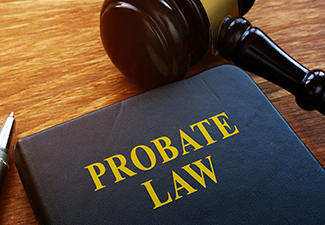Common Misconceptions About Probate
March 28, 2022
 When a loved one passes away, it can be hard to balance everything that needs to be done while also trying to grieve and be there for your family. One of the most overwhelming aspects of this time is figuring out what to do with the estate that was left behind. Maybe you’re wondering what will happen with your own estate, or you may have been named the executor for an estate or the court has appointed you as the administrator. Either way, it will be someone’s responsibility to administer the estate and the more you understand about this process, the easier it will be.
When a loved one passes away, it can be hard to balance everything that needs to be done while also trying to grieve and be there for your family. One of the most overwhelming aspects of this time is figuring out what to do with the estate that was left behind. Maybe you’re wondering what will happen with your own estate, or you may have been named the executor for an estate or the court has appointed you as the administrator. Either way, it will be someone’s responsibility to administer the estate and the more you understand about this process, the easier it will be.
This is an important but not impossible job, and you may be unsure about what’s required of you, especially as it relates to the process of probate. If you’re in Ocala, Florida, or anywhere throughout Marion County, call me — Michael A. Siefert, P.A. — today for help with probate or any other part of the estate planning process.
Five Common Misconceptions About Probate
The complexity of the probate process has led to several misunderstood factors. Below, you will find a list of some of these common misconceptions and the truth about the probate process.
If I Have a Will, My Estate Won’t Go Through Probate
Wrong. All wills must go through probate. A will is an indispensable part of any estate plan, but it is limited in certain ways. After someone passes away, only a judge can legally sign over the assets listed in a will to the beneficiaries. Because of this, the will must be “proven” in court, meaning the contents are reviewed, the assets are accounted for, and debts are settled. For someone with a very large estate, this can mean a very complex process, but for most people, probate will be fairly straightforward, though some work and time will be required.
Probate Means That the State Gets All of My Assets
This will only happen in very rare cases, and most of the time, your assets will go to your named beneficiaries. If you die without a will (known as dying “intestate”), the state will then be responsible for distributing your assets. First in line to inherit is usually a surviving spouse and children, and the state will make every effort to locate family members. The only situation in which the state would take the assets would be if they can’t locate any relatives. Those who do die with a will (and everyone should have a will), will see their assets distributed to their named beneficiaries after the will has gone through probate.
The Probate Process Takes Years to Finalize
There is a common misconception that probate takes a long time to complete, and while probate doesn't necessarily happen quickly, the process for most estates will be completed within about six months. This delay in processing is mandated by the state to give creditors enough time to file claims and receive any debt payment that’s due to them. Other factors that may make the process drag on typically don’t have anything to do with probate itself. Delays could be due to family in-fighting or a very large estate with complicated taxes.
Estate Taxes Will Consume Most of My Estate
Although you hear many stories about wealth being eaten up by estate taxes, this is not as common as you may think. In reality, only the largest estates (meaning those that exceed $12,060,000) are subject to a federal inheritance tax (sometimes referred to as the “death tax”), but in Florida, you’ll be protected from other forms of taxes. Florida doesn't impose its own state inheritance tax and inherited money is not subject to income tax.
There are other financial obligations that you’ll have to pay including filing fees, appraisal fees (if necessary), costs of publishing required legal notices, and any attorney fees. This will generally run you a few thousand dollars total, but you can use assets from the estate to pay them.
I Don’t Need an Attorney to Go Through the Probate Process
While it’s true that you aren’t required to hire a probate attorney to help you with this process, an experienced lawyer can prove very helpful during this time. Even if you only hire an attorney to consult with briefly, they can provide you with peace of mind knowing that each step is being completed correctly. For more complicated estates, you should definitely hire an attorney to cut down on costs and make the entire process take less time.
How an Experienced Attorney Can Help
Even the simplest estates will take time and effort to work through. The best thing you can do for yourself is to write a comprehensive will and appoint a responsible executor that you can trust to carry out your wishes. However, even the most conscientious executor will need help now and then, and an experienced attorney can help ease the burden. I started my firm — Michael A. Siefert, P.A. — to assist people going through this complicated and stressful time, and I am ready to help you too. If you’re in Ocala, Florida, or anywhere in Marion County, call me today to set up an appointment.
